

The Federal Reserve DOES NOT create money out of thin air. But you think exactly what they want you to think as with most of the sheople ....
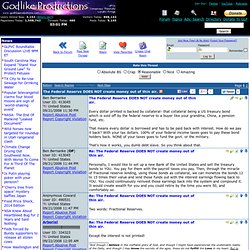
"The regional Federal Reserve banks are not government agencies. ...but are independent, privately owned and locally controlled corporations. " -- Lewis vs. United States, 680 F. 2d 1239 9th Circuit 1982 The Rothschilds "The few who understand the system, will either be so interested from it's profits or so dependant on it's favors, that there will be no opposition from that class.
" -- Rothschild Brothers of London, 1863 "Give me control of a nation's money and I care not who makes it's laws" -- Mayer Amschel Bauer Rothschild Senators & Congressmen "Most Americans have no real understanding of the operation of the international money lenders. "This [Federal Reserve Act] establishes the most gigantic trust on earth. "From now on, depressions will be scientifically created. " -- Congressman Charles A.
The Federal Reserve Cartel: The Eight Families. This article was first published on Global Research June 1, 2011 (Part one of a four-part series) The Four Horsemen of Banking (Bank of America, JP Morgan Chase, Citigroup and Wells Fargo) own the Four Horsemen of Oil (Exxon Mobil, Royal Dutch/Shell, BP and Chevron Texaco); in tandem with Deutsche Bank, BNP, Barclays and other European old money behemoths.
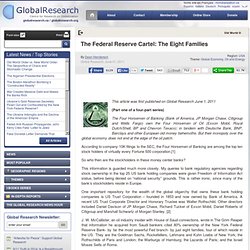
Who Owns the Federal Reserve. Who Owns The Federal Reserve? This article was first published by Global Research in October 2008.
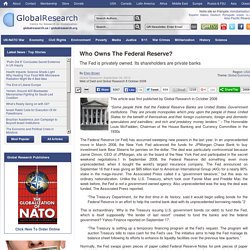
US federal deficit: how much does China own of America's debt? America's federal deficit up and China owns lots of it The US Federal Deficit is always in the news - and when Chinese premier Hu Jintao arrives to a lavish reception at the White House, he comes as bigger lender to the developing world than the World Bank.
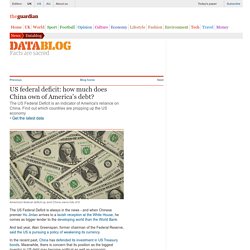
And last year, Alan Greenspan, former chairman of the Federal Reserve, said the US is pursuing a policy of weakening its currency. In the recent past, China has defended its investment in US Treasury bonds. Meanwhile, there is concern that its position as the biggest investor in US debt may become political as well as economic. Treasury bonds are how the US - and all governments for that matter - borrow money: they issue government securities, which other countries and institutions buy.
Mapped by Many Eyes. Previously, China has expressed concern over the security of its vast United States treasury holdings and premier Wen Jiabao has urged Washington to safeguard their value. Data summary. Abolish the Federal Reserve. Who Owns The Federal Reserve? - Find Answers to this Question. Who Owns the Fed? Free Enterprise Zone, The Freeman, Warren C.
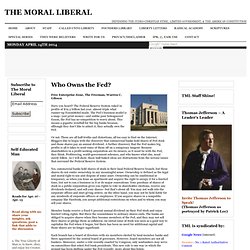
Gibson Have you heard? The Federal Reserve System raked in profits of $79.3 billion last year, almost triple what runner-up ExxonMobil made. The Fed’s business model is a snap—just print money—and unlike poor beleaguered Exxon, the Fed has no competition to worry about. This means a gigantic windfall for the big banks because, although they don’t like to admit it, they actually own the Fed. Or not. Yes, commercial banks hold shares of stock in their local Federal Reserve branch, but these shares do not confer ownership in any meaningful sense. Member banks receive a fixed 6 percent annual dividend on their Fed stock and enjoy limited voting rights. Each branch has a board of directors with six members elected by local member banks and three appointed by the central board of governors. Project World Awareness. Chart of who “owns” the Federal Reserve…once again… ;) A picture from the gold vault of the Federal Reserve Bank of New York (Photo credit: Wikipedia) Chart 1 Federal Reserve Directors: A Study of Corporate and Banking Influence Published 1976.
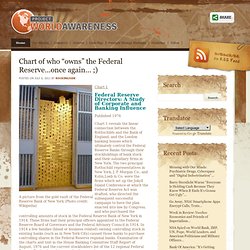
Fed Panel Is Divided on Direction. The Evolution Of Banking. With the exception of the extremely wealthy, very few people buy their homes in all-cash transactions.
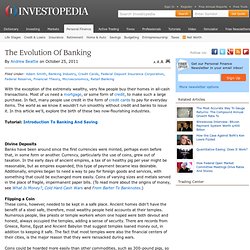
Most of us need a mortgage, or some form of credit, to make such a large purchase. In fact, many people use credit in the form of credit cards to pay for everyday items. The world as we know it wouldn't run smoothly without credit and banks to issue it. In this article we'll, explore the birth of these two now-flourishing industries. Tutorial: Introduction To Banking And Saving Divine DepositsBanks have been around since the first currencies were minted, perhaps even before that, in some form or another. Flipping a CoinThese coins, however, needed to be kept in a safe place. Coins could be hoarded more easily than other commodities, such as 300-pound pigs, so there emerged a class of wealthy merchants that took to lending these coins, with interest, to people in need. The Federal Reserve: Introduction. Most people are aware that there is a government body that acts as the guardian of the economy - an economic sentinel who implements policies designed to keep the country operating smoothly.
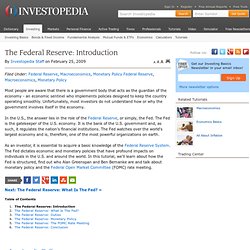
How Protests Could Change Banking - Investopedia.com. Amidst the macro worries about European sovereign debt and the ignition of the next election cycle, a protest movement called Occupy Wall Street has garnered a great deal of attention for itself.
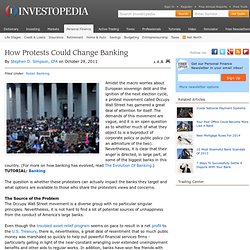
The demands of this movement are vague, and it is an open question as to whether much of what they object to is a byproduct of corporate policy or public policy (or an admixture of the two). Nevertheless, it is clear that their anger is directed, in large part, at some of the biggest banks in this country. (For more on how banking has evolved, read The Evolution Of Banking.) TUTORIAL: Banking The question is whether these protesters can actually impact the banks they target and what options are available to those who share the protesters views and concerns. The Source of the ProblemThe Occupy Wall Street movement is a diverse group with no particular singular principles.
Even though the troubled asset relief program seems on pace to result in a net profit to the U.S. Audit the Fed. Federal Reserve System. How the Fed Works" History of the Federal Reserve System.